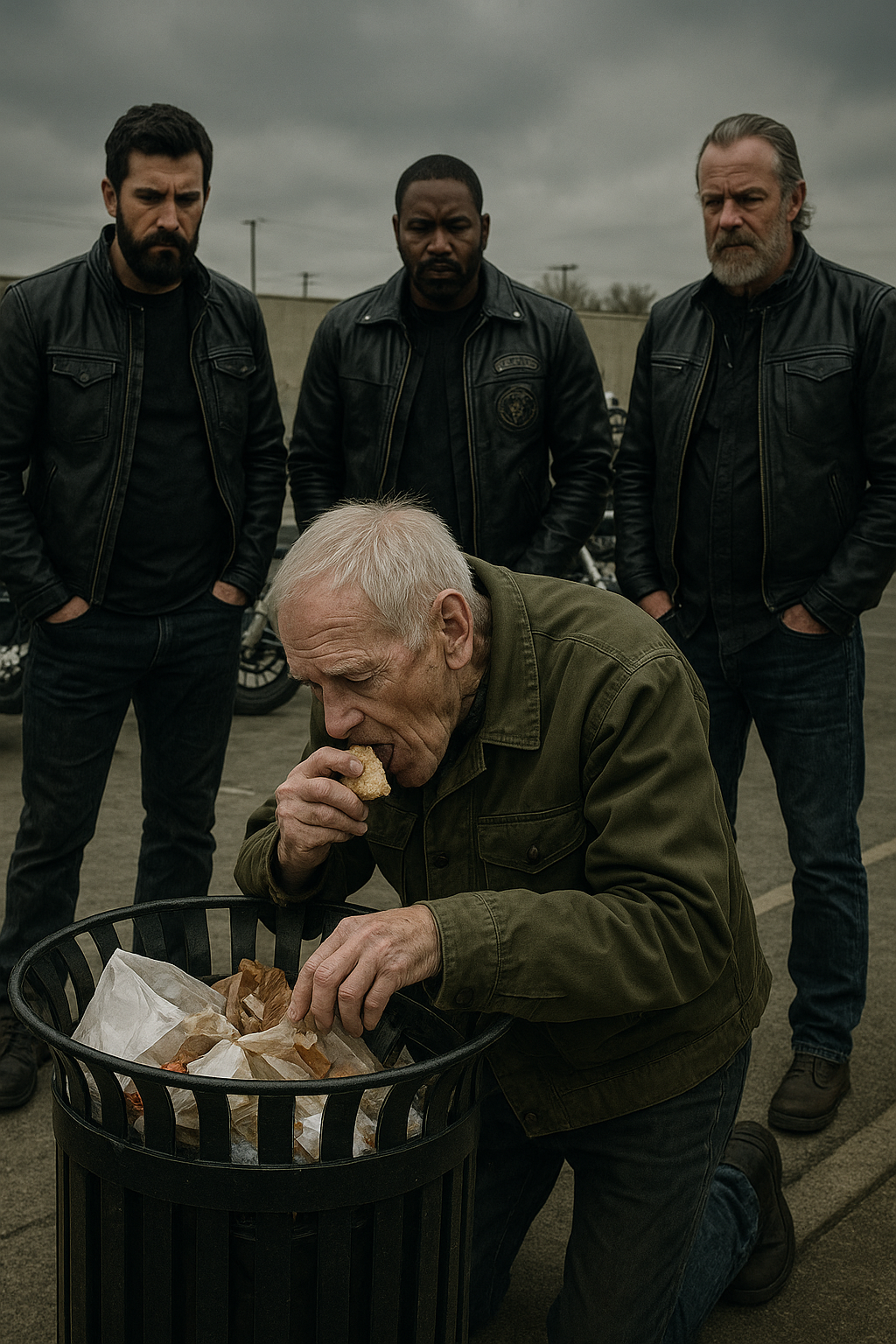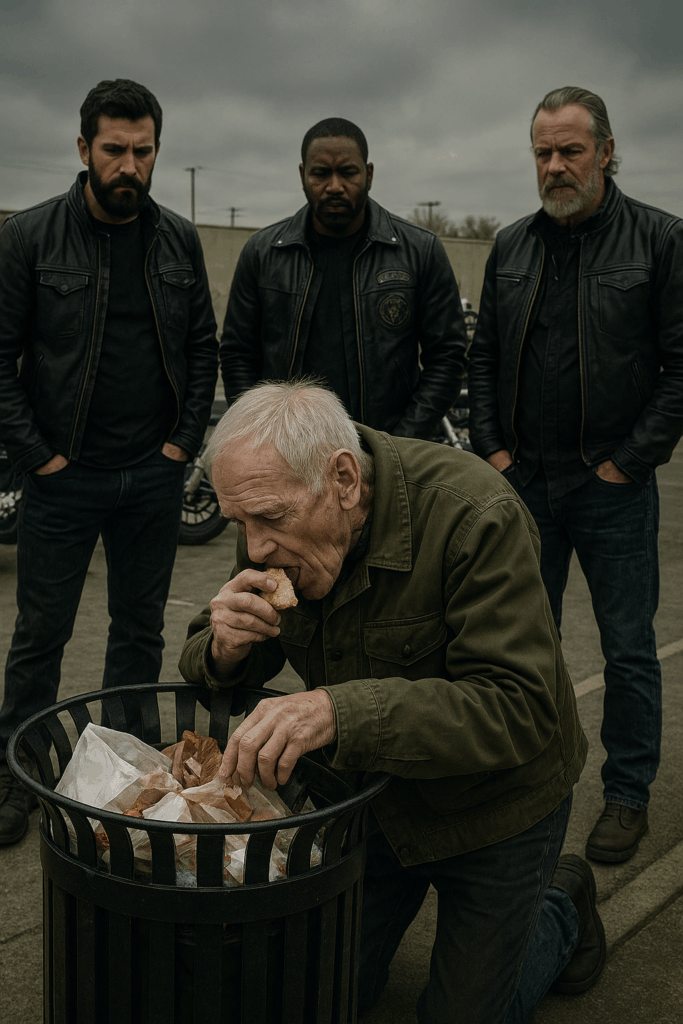The morning sun crept slowly over Highway 19, turning the dew on the parked motorcycles into tiny sparks of light. The Iron Wolves Motorcycle Club had gathered, as they always did, at Dottie’s Diner, a peeling roadside place that smelled of bacon grease, burnt coffee, and memories.
Inside, laughter rumbled like distant thunder. Men with faces carved by weather and war swapped stories, insults, and old jokes that only made sense to those who had seen the same darkness. They weren’t outlaws anymore. Not since the wars ended and their hair turned gray. Now, the Iron Wolves rode for charity runs, veteran funerals, and forgotten causes.
Every Thursday, they gathered here—brothers who’d survived the kind of things polite society liked to forget.
At the center of the table sat Jack “Hammer” Malone, seventy years old and still broad as a refrigerator. A Vietnam vet. Mechanic by trade. Leader by accident. When he spoke, people listened. When he laughed, people joined in. Next to him was Doc, a medic who never stopped patching up people—even when the wounds weren’t physical anymore. And then there was Hawk, who’d been too quiet since his wife died. His right knee clicked with every step, a souvenir from Iraq.
It was supposed to be an ordinary Thursday. But fate never sends a warning before it rewrites your story.
The Stranger Behind the Diner
Doc was the first to notice. Through the fogged diner window, beyond the reflection of their laughter, someone was moving behind the building—slow, deliberate, steady. A man hunched over the trash bins, not desperate, not frantic… almost disciplined. At first, Doc thought it was just another drifter. Then he saw the jacket. Olive green. Torn at the seams. A faded patch—82nd Airborne.
He felt a chill crawl up his spine. “Jack,” he murmured, “you see that?”
Jack turned, following his gaze. The man outside was older, gray-haired, moving like a soldier who had forgotten how to stop marching. He lifted the lid of a trash can, found a half-eaten sandwich, and—before eating—wiped the edge clean with a napkin.
Even in hunger, he had dignity. Jack’s jaw tightened. “Come on,” he said. “Let’s meet him.”

The bell above the diner door jingled as the Iron Wolves stepped out, their boots crunching on gravel. The man froze. His hand tightened around a plastic bag filled with scraps. His eyes—pale, alert, haunted—met theirs.
“I’m not looking for trouble,” he said, voice rough as sandpaper. “I’ll move along.”
Jack shook his head. “We’re not here to chase you off, brother.”
He nodded toward the man’s sleeve. “That patch—Airborne?”
The man hesitated, then gave a small nod. “Yeah. Long time ago.”
Doc’s eyes softened. “My dad was 82nd. Bastogne.”
The old man blinked—surprise flickered beneath the fatigue. “That’s… a good man’s unit.”
“What’s your name?” Jack asked.
“Charlie,” he said after a pause. “Charles Denton. Staff Sergeant. Retired.”
The way he said retired carried a weight—like he didn’t believe it himself.
“When’s the last time you ate, Charlie?”
“Tuesday,” Charlie said quietly. “Church on Pine Street. They serve soup Tuesdays.”
It was Thursday. Jack’s chest ached. He extended his hand. “Come inside. Breakfast is on us.”
Charlie’s back straightened. “I don’t take charity.”
Jack smiled faintly. “Good. Because we don’t give it. Just breakfast between soldiers.”
Charlie looked at him for a long moment—like he was testing if this was some kind of trick.
Then, slowly, he nodded.
The Table of Brotherhood
When they walked back into Dottie’s, every head turned. Not because of the bikers—they were regulars—but because of the man with them. Charlie looked out of place in the light. His jacket was sun-bleached, his face lined, but his posture was straight as a rifle barrel.
Jack motioned toward the booth. “Sit, Sergeant. You’ve earned it.”
Dottie, who’d been refilling coffee for twenty years, raised an eyebrow but said nothing. Doc called out, “Four breakfasts. Eggs, bacon, pancakes. And keep the coffee coming.”
When the food came, Charlie hesitated. His hands shook as he picked up the fork. Then he took a bite.
The sound of sizzling bacon and soft laughter filled the air. For the first time in a long time, Charlie closed his eyes—not from pain, but peace.
“Good?” Hawk asked.
Charlie nodded. “Best meal I’ve had since Marjorie died.”
“Your wife?” Doc asked gently.
“Yeah,” Charlie said, voice cracking. “She passed in 2018. Cancer. After that… I kinda stopped keeping track of things.”
He gave a humorless laugh. “When you lose your home and your reason to go home, it all blurs together.”
No one spoke for a while. They didn’t have to.
Jack finally said, “You got anyone left? Kids?”
“None. Just me.”
Jack looked at him, then at the others. “Well, not anymore,” he said. “You got us.”
That afternoon, the Iron Wolves canceled their charity run. Instead, they rode for Charlie. He sat on the back of Jack’s Harley, wearing a spare helmet and a patched-up leather jacket. The road stretched wide before them, the wind whipping against their faces like freedom reborn. As they rolled down Main Street, engines roaring in perfect rhythm, people turned to watch. Some clapped. Some just stared. Charlie sat tall, back straight, eyes forward—like a soldier leading a parade again. They stopped at a small building behind Doc’s garage. Upstairs was a one-room apartment with a clean bed and a view of the highway.
“What’s this?” Charlie asked.
“Temporary quarters,” Jack said. “Belongs to a buddy deployed overseas. You’ll stay here.”
“I can’t accept—”
“Too late,” Doc interrupted. “We already put milk in the fridge.”
Laughter broke the tension. For the first time in years, Charlie laughed too. That night, they shared pizza and cheap beer. They told stories—the funny kind, the sad kind, and the kind that ended with silence and a thousand-mile stare.
When Charlie looked out the window at the stars, he whispered, “I thought I was invisible.”
Jack raised his bottle. “Not to us, you’re not.”
The Return of Hope
Two weeks later, the Iron Wolves hosted their biggest fundraiser of the year: Ride for the Fallen. The parking lot buzzed with chrome, leather, and music. Banners fluttered in the wind—this year’s proceeds would fund housing for homeless veterans. But this year, there was a new face at the registration booth. Charlie, clean-shaven, wearing a new jacket with a freshly stitched patch: Iron Wolves MC — Brotherhood Rides On.
When Jack introduced him to the crowd, telling how they’d found him behind Dottie’s Diner, the place went quiet. Then, applause erupted like thunder. People came forward—some to shake his hand, others just to say thank you. Charlie’s eyes glistened, but he stood tall. He’d been forgotten once. Not anymore.
A week later, Jack knocked on Charlie’s door for their usual breakfast.
No answer.
The bed was neatly made. The room spotless. On the kitchen table sat a folded flag, a black-and-white photo of a young couple in uniform—and a letter addressed to The Iron Wolves.
Brothers,
You found me when I didn’t even know I was lost.
You gave me food, laughter, a home. But more than that—you gave me back myself.
There’s a veterans clinic two towns over that needs volunteers. I’m going there.
Not to hide. To help. Maybe I can do for someone else what you did for me.
Don’t worry. I’ll be okay. You saved me already.
Forever grateful,
Staff Sergeant Charles Denton
Doc read the letter twice before handing it to Jack. No one spoke. They just nodded. They knew he’d found his next mission.
The Final Call
Three months later, on a quiet Sunday morning, Jack’s phone rang. It was the VA hospital. Charlie Denton had passed away in his sleep. Peaceful. No pain. The nurse said he’d spent his last weeks counseling younger vets—guys half his age who’d thought they were beyond saving. On his bedside table was one final note.
“Tell the Iron Wolves… I finally made it home.”
The funeral drew hundreds. Veterans, bikers, old friends, and strangers who’d heard the story. Engines lined the cemetery road like an honor guard.When the coffin passed, every Iron Wolf raised two fingers to the sky—a salute reserved for brothers.
The mayor declared it “Charles Denton Veterans Day.” The local paper called it “A life reclaimed by kindness.” But to the Wolves, it was simpler than that. It was about one man who reminded them what their patches meant. Jack placed his hand on the flag-draped coffin and whispered, “Ride easy, soldier. You’re home.”
When the engines roared to life again, the sound rolled across the valley like thunder—a final salute.
Today, above the bar at Dottie’s Diner, hangs a framed photograph.
Five men—Jack, Doc, Hawk, and in the center, Charlie—smiling beside their bikes, sunlight catching on chrome. Beneath it, engraved in brass:
“One act of kindness can rescue a soldier long after the war is over.”
And every Thursday morning, when the Iron Wolves roll into the diner, they leave one seat empty at their booth. It’s always waiting. For the next Charlie Denton who might need to be found.
When Jack locks up his bike at the end of each ride, he sometimes catches himself looking at the horizon, half-expecting to see Charlie walking toward them—calm, proud, and finally at peace. Because maybe that’s the truth of it: The war never really ends when the shooting stops. It ends in small, unseen moments—over coffee, laughter, and the quiet kindness of strangers who refuse to let you disappear.
So maybe the question isn’t what saved Charlie Denton. Maybe it’s this:
Who out there is still waiting to be found?


